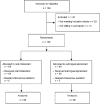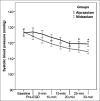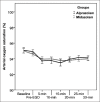Premedication with benzodiazepines for upper gastrointestinal endoscopy: Comparison between oral midazolam and sublingual alprazolam
- PMID: 29387120
- PMCID: PMC5767812
- DOI: 10.4103/jrms.JRMS_432_17
Premedication with benzodiazepines for upper gastrointestinal endoscopy: Comparison between oral midazolam and sublingual alprazolam
Abstract
Background: Premedication with orally administered benzodiazepines is effective in reducing anxiety and discomfort related to endoscopic procedures. We evaluated the efficacy and safety of oral midazolam in comparison to sublingual alprazolam as premedication for esophagogastroduodenoscopy (EGD).
Materials and methods: Adult candidates for diagnostic EGD received either oral midazolam (7.5 mg in 15 cc apple juice) or sublingual alprazolam (0.5 mg) 30 min before EGD. Procedural anxiety and pain/discomfort were assessed using 11-point numerical rating scales. Patients' overall tolerance (using a four-point Likert scale) and willingness to repeat the EGD, if necessary, were also assessed. Blood pressure, heart rate, and arterial oxygen saturation were monitored from medication to 30 min after the procedure.
Results: Patients experienced a similar reduction in procedural anxiety after medication with oral midazolam and sublingual alprazolam; mean (standard deviation [SD] of 1.86 [1.63] and 2.02 [1.99] points, respectively, P = 0.91). Compared to oral midazolam, pain/discomfort scores were lower with sublingual alprazolam; mean (SD) of 4.80 (3.01) versus 3.68 (3.28), P = 0.024. There was no significant difference between the two groups in patients' tolerance, willingness to repeat the procedure, or hemodynamic events.
Conclusion: Oral midazolam and sublingual alprazolam are equally effective in reducing EGD-related anxiety; however, EGD-related pain/discomfort is lower with alprazolam. Both benzodiazepines are equally safe and can be used as premedication for patients undergoing diagnostic EGD.
Keywords: Anxiety; benzodiazepines; endoscopy; esophagogastroduodenoscopy; premedication; sedation.
Conflict of interest statement
There are no conflicts of interest.
Figures




References
-
- Brandt LJ. Patients’ attitudes and apprehensions about endoscopy: How to calm troubled waters. Am J Gastroenterol. 2001;96:280–4. - PubMed
-
- Campo R, Brullet E, Montserrat A, Calvet X, Moix J, Rué M, et al. Identification of factors that influence tolerance of upper gastrointestinal endoscopy. Eur J Gastroenterol Hepatol. 1999;11:201–4. - PubMed
-
- Abraham NS, Fallone CA, Mayrand S, Huang J, Wieczorek P, Barkun AN. Sedation versus no sedation in the performance of diagnostic upper gastrointestinal endoscopy: A Canadian randomized controlled cost-outcome study. Am J Gastroenterol. 2004;99:1692–9. - PubMed
-
- Cohen LB, Delegge MH, Aisenberg J, Brill JV, Inadomi JM, Kochman ML, et al. AGA Institute review of endoscopic sedation. Gastroenterology. 2007;133:675–701. - PubMed
LinkOut - more resources
Full Text Sources
Other Literature Sources

